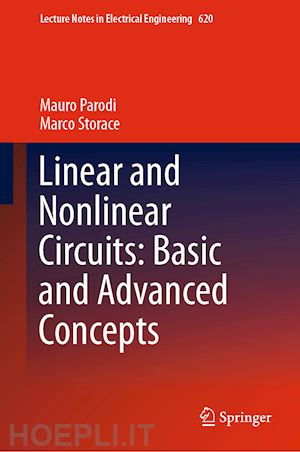
Questo prodotto usufruisce delle SPEDIZIONI GRATIS
selezionando l'opzione Corriere Veloce in fase di ordine.
Pagabile anche con Carta della cultura giovani e del merito, 18App Bonus Cultura e Carta del Docente
This book provides readers with the necessary background information and advanced concepts in the field of circuits, at the crossroads between physics, mathematics and system theory. It covers various engineering subfields, such as electrical devices and circuits, and their electronic counterparts. Based on the idea that a modern university course should provide students with conceptual tools to understand the behavior of both linear and nonlinear circuits, to approach current problems posed by new, cutting-edge devices and to address future developments and challenges, the book places equal emphasis on linear and nonlinear, two-terminal and multi-terminal, as well as active and passive circuit components.
This second volume focuses on dynamical circuits, which are characterized by time evolution and by the concept of state. The content is divided into a set of introductory and a set of advanced-level topics, mirroring the approach used in the previously published volume. Whenever possible, circuits are compared to physical systems of different natures (e.g. mechanical or biological) that exhibit the same dynamical behavior. The book also features a wealth of examples and numerous solved problems. Further topics, such as a more general framing of linear and nonlinear components, will be discussed in volume 3.
Basic concepts: two-terminal linear elements with memory and ?rst-order linear circuits.- Advanced concepts: ?rst-order nonlinear circuits.- Basic concepts: linear two-ports with memory and higher-order linear circuits.- Advanced concepts: Higher-order nonlinear circuits – State equations and equilibrium points.- Basic concepts: Analysis of LTI circuits in sinusoidal steady state.- Advanced concepts: Analysis of nonlinear oscillators.
Mauro Parodi was appointed full professor of Basic Circuit Theory by the Engineering Faculty at the University of Genoa, Italy, back in 1985. His scientific and teaching activity has been focusing on nonlinear circuits and systems theory, nonlinear modeling, and mathematical methods for treatment of experimental data. He is currently affiliated with the Department of Electrical, Electronic, Telecommunications Engineering and Naval Architecture at the University of Genoa, where he has been teaching Mathematical Methods for Engineers and Applied Mathematical Modeling.
Marco Storace received a Ph.D. degree in Electrical Engineering from the University of Genoa, Italy, in 1998. He was appointed full professor by the same university in 2011 and is currently affiliated with the Department of Electrical, Electronic, Telecommunications Engineering and Naval Architecture. He was a visiting professor at Ecole Polytechnique Fédérale de Lausanne (EPFL), Lausanne, Switzerland, in 1998 and in 2002. The main focus of his research is on theory and applications of nonlinear circuits, with a special emphasis on circuit models of nonlinear systems, such as systems with hysteresis and biological neurons. He is also concerned with methods for piecewise linear approximation (and circuit synthesis) of nonlinear systems, and bifurcation analysis and nonlinear dynamics alike. He has been teaching Basic Circuit Theory, Analog and Digital Filters, and Nonlinear Dynamics at the University of Genoa. From 2008 to 2009 he served as an associate editor of the IEEE Transactions on Circuits and Systems. He is serving as a Chair Elect (2019/2021) of the IEEE Technical Committee on Nonlinear Circuits and Systems (TC-NCAS).
Mauro Parodi and Marco Storace are also the authors of “Linear and Nonlinear Circuits: Basic & Advanced Concepts – Volume 1” published by Springer in 2018, ISBN 978-3-319-61233-1 (Hardcover), ISBN 978-3-319-61234-8 (eBook).











Il sito utilizza cookie ed altri strumenti di tracciamento che raccolgono informazioni dal dispositivo dell’utente. Oltre ai cookie tecnici ed analitici aggregati, strettamente necessari per il funzionamento di questo sito web, previo consenso dell’utente possono essere installati cookie di profilazione e marketing e cookie dei social media. Cliccando su “Accetto tutti i cookie” saranno attivate tutte le categorie di cookie. Per accettare solo deterninate categorie di cookie, cliccare invece su “Impostazioni cookie”. Chiudendo il banner o continuando a navigare saranno installati solo cookie tecnici. Per maggiori dettagli, consultare la Cookie Policy.